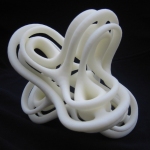|
Introduction: Topological Mesh Modeling |
Topological Mesh Modeling is an umbrella term that covers all our work based on extensions the theory of graph rotation systems.
It includes (1) Orientable 2-manifol mesh modeling using graph rotation systems and its computer graphics applications,
(2) Knot modeling with immersions of non-orientable manifold meshes and (3) Topological constructions that is based on geometric and physical
constraints with graph rotation systems. We recently started to work on
immersions of 3-manifolds as a representation to develop shape modeling systems. Click links below to go to related papers and manuscripts.

- Orientable Mesh Modeling: We have
provided a solid foundation for orientable 2-manifold mesh modeling using graph rotation systems.
Based on this theory, we have developed TopMod ,
which is is an orientable 2-manifold mesh modeling system. TopMod provides
a wide vriety of High Genus Modeling tools, Remeshings & Subdivisions, and
Extrusions & Replacements.
Using TopMod, one can find a wide variety of ways to create high genus shapes;
almost all subdivision algorithms, wide variety of ways to remeshing shapes and
new extrusions. These tools are also useful for Architectural applications, Design and Sculpting
and Sketch Based Modeling.

- Knots Modeling: We have developed provided
a solid foundation for knot, link and cyclic woven object modeling using extended graph rotation systems.
If we twist an arbitrary subset of edges of a mesh on an
orientable surface, we can obtain non-orientable surfaces. The resulting extended graph rotation system can be used
to induce a cyclic weaving on the original surface, that corresponds a 3-space immedding of a non-orientable surface.
- Topological Constructions: Discrete Gaussian-Bonnet theorem and Gaussian curvatures related
mesh topologic concepts to geometry. Using this relationship, we have developed methods to phsyically construct shapes.
- Immersions of 3-Manifolds: Using an extension of graph rotation systems it is possible
to represent 3-space immersions of 3-manifolds by employing a topological graph theory concept called 3D thickening.
|
|

